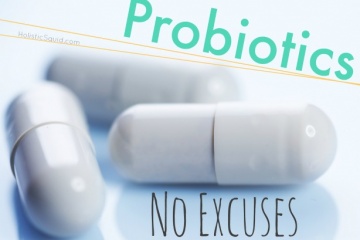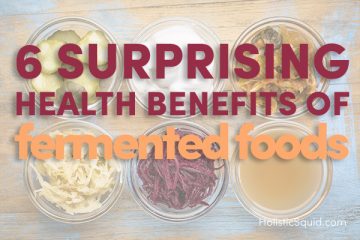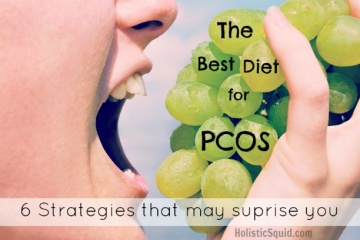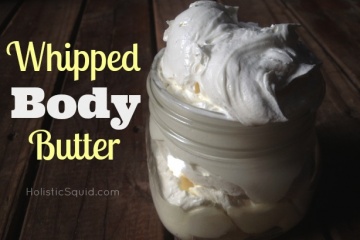
When it comes to making healthy choices about food and lifestyle, there are three excuses that come up again and again as to why not.
1 – I don't believe it's really that important.
2 – I don't have the time or energy.
3 – I can't afford it.
Probiotics are one of those choices. The health benefits of probiotics are undeniable…so no more excuses!
Allow me to explain why probiotics are so important.
We have become a germ-o-phobic culture. We use antibacterial soap at most sinks, ultra-pasteurize our food, and even disinfect our shopping carts before we touch them. It's not to say that hygiene is bad, but when it comes to food and our digestive tracts, the presence of good bacteria is essential to good overall health.
In the olden days our food was harvested locally – fruits and vegetables were dug out of the earth or picked off of a tree and rinsed before cooking or eating. Now our food is sprayed with bleach or worse (even the organics, folks!) before shipping thousands of miles to sit on a shelf before we buy it. The methods used to keep food fresh longer eradicates nearly all living micro-organisms – good and bad – from our food.
Before refrigeration, our ancestors used traditional methods of culturing and fermenting that not only preserved food, but also cultivated rich probiotics served at every meal. Now even our pickles are devoid of natural culture and our dairy products are pasteurized to the point of containing no beneficial strains of bacteria.
The only remnant of cultured food is yogurt which is inoculated with acidophilus and other healthy strains. But yogurt alone is not enough to save our imbalanced gut flora that is overrun by bad bacteria and yeast.
For these reasons, probiotics are one of the few daily supplements that I recommend for just about everyone. There are several ways to get your daily dose, and you can choose based on time, money, and the needs of your body.
Probiotic supplementation
The easiest way to ensure that your body is populated with good strains of bacteria is to take a high quality probiotic. Probiotics come in different forms from fruity chewables for kids to enteric coated capsules for adults.
The main downside to probiotic supplementation is the cost – while you can buy cheap probiotics, you usually get what you pay for. Most probiotic supplements need to be refrigerated, so it also takes an extra effort to remember to take them each day.
When choosing a probiotic supplement, you want a high potency (usually in the 10's of billions) and a diverse strain – unless your practitioner has advised that you limit certain strains. The following are a few good ones available either in health food stores, online, or at your practitioner's office:
- Bio-Kult
- Klaire Labs
- Jarrow
- MegaFlora by Mega Foods
Be sure to note what the other ingredients are in the supplement – some, like Jarrow, contain dairy and therefore should be avoided by those with sensitivities to dairy.
Store-bought cultured foods
In many health foods stores these days, it's easy to spot bottles of kombucha, yogurt, and naturally fermented veggies (such as Bubbies sauerkraut and pickles and traditional kimchi). This option will save you time but costs more money than when you make these foods at home.
Homemade cultured foods
Many of these foods are not nearly as complicated or time consuming as you may think. They require very little equipment, and will save you loads of money as compared to the other two options. Here are just a few ideas:
- Drinks such as kombucha, beet kvass, cultured lemonade or root beer, or kefir sodas
- Cultured dairy (use milk from grass-fed cows) including homemade yogurt, kefir, cultured butter, and homemade cheeses
- Cultured veggies – traditional sauerkraut, kimchee, pickled beets, ginger carrots, and many more
- Cultured condiments including mustard, mayonnaise, salsa, and my Practically Perfect Ketchup
You can find tons of great recipes online, and Sandor Katz's book Wild Fermentation is a great resource that explores the fun and delicious world of cultured foods. Find starter cultures for yogurt, kombucha, kefir and more here.
Besides cultured foods, aim to buy as much of your food as possible direct from your farmer, and ask him or her how it is processed before you buy them. If you've got a green thumb, grow your own fruit and veggies using organic methods.
When you need more
If you have digestive issues (acute or chronic), allergies, asthma, skin issues, emotional imbalance, a history of antibiotic use, or you just don't feel well, it is a good idea to take a probiotic supplement in addition to eating cultured foods daily. All babies consuming formula should supplement with an infant probiotic – like this one – at the very minimum.
Sometimes, probiotics alone may not be enough. A special elimination diet such as the GAPS diet can help to heal your gut flora and even reverse food allergies including lactose intolerance or wheat sensitivities.
Take this quiz to find out if you may have “Leaky Gut Syndrome,” a condition where the intestines do not properly filter food, leading to a long list of health issues both big and small – you may be surprised!
Have an excuse that I haven't mentioned here?
…Let's hear it in the comments below!
Do you take full advantage of all of the health benefits of probiotics?










Hi I was wondering where one would find a recipe for cultured lemonade & root beer
Hi!
I’m wondering how safe it is to be purchasing all those probiotics online ??
Hi Zvezda – May probiotics are more stable than you might think as long as they don’t get heated to high temps, but to be sure, look for companies that will ship the probiotics with ice packs.
I see everyone in the real food community keeps singing praises to kefir, but no one says how to make it, I looked around the web, but there are so many variations and the instructions seem unclear. Could you give a few basic recipes for raw milk kefir?
What are your thoughts on PREbiotics? Should people be making sure to get enough of those too? I heard (might be a myth) that some probiotics need prebiotics to feed off of and if you don’t have enough pre’s then your pro’s can actually do you more harm than good. True? False?
http://holisticsquid.com/prebiotic-foods/
I’m confused about healing a leaky, candida over growth and gut and fermented foods. So I can or can not drink kombucha? What about the FCLO I’ve been faithfully taking? Any feed back you could give would be much appreciated.
Thanks
What is your opinion on PB 8?
I have an autoimmune disease (Hashimoto’s), which I am treating with real foods and a gluten-free diet, as well as a few choice supplements. I know it’s not a great idea to ramp up the immune system when it’s autoimmune, but I’m still trying to eat plenty of fermented and cultured foods. This is good, right? I just don’t want to fire my system up to kick my butt again. I’m off the thyroid meds and everything’s been going beautifully on my labs since going GF and switching to real food. PS I love your blog!!
Thanks Kate! If anything, start slow when making changes with diet and supplements to see what works for your own body. Hope that helps!
I love Prescript-Assist (pre and pro biotics). It’s one of the few supplements I take where I can tell a real difference on the days I take it. But it’s soo expensive, I’m glad to see some more affordable choices on your list. Thanks for the suggestions!
After much research, I’ve come to realize just how important this really is and it’s very hard to get people to understand this! What I use is Probio5 by Plexus and I’ve seen a big difference in my lactose intolerance, skin and it has kept me well when everyone around me is sick! It has 5 essential strains and under $25 so I find it very affordable considering all the benefits! Thanks for a great article!
hi, I am taking antibiotics right now for 7 days and I was wondering how long should I take probiotics for? How can I tell when my body is balanced again? thanks!
Molly, there is no set time period that you should take probiotics for. Your body might take longer to heal depending on the state of your gut once you are done with your antibiotics. It’s best to take them for up to a month and then if you still feel you need to continue, you can.
I am wondering about probiotics for kids. All of the options on your list are in capsules. Are there good chewable probiotics available?
Jarrow makes a kids chewable raspberry flavored probiotic that my five year old loves taking everyday. It’s called “yum-yum dophilus”
http://www.iherb.com/Jarrow-Formulas-Yum-Yum-Dophilus-Sugar-Free-Natural-Raspberry-Flavor-120-Chewable-Tablets-Ice/24592?CAWELAID=120224250000012855&gclid=CN2D-aeTmc0CFZI9gQod3gEJRA
Hi Jessica, here’s a good post with all my recommendations for kids probiotics included. Hope this helps.
We have just seen a dramatic change in a family member who struggles with anxiety and OCD. After taking a probiotic from Seeking Health called Probiota 12 with bifudus and lactobacillus in it she has stopped having anxiety and her OCD has almost completely gone away in 1 week. IT is very dramatic.